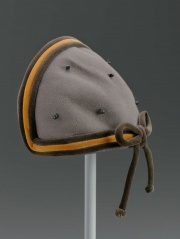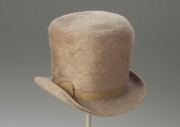Difference between revisions of "Felt"
| Line 11: | Line 11: | ||
==Applications== | ==Applications== | ||
| − | * Blankets, hats, rugs, table cloths | + | * Blankets, hats, rugs, table cloths, placemats |
* Insulation, filtration, geotextiles | * Insulation, filtration, geotextiles | ||
* Polishing cloths, absorbent cloths | * Polishing cloths, absorbent cloths | ||
| − | * Protective liners, padding | + | * Protective liners, padding, fillers |
* Crafts, toys, decorations | * Crafts, toys, decorations | ||
| Line 23: | Line 23: | ||
! 100% Wool Felt or Wool Blend | ! 100% Wool Felt or Wool Blend | ||
! Cotton Felt | ! Cotton Felt | ||
| + | ! Rayon/Viscose felt | ||
! Acrylic Felt | ! Acrylic Felt | ||
! Polyester Felt | ! Polyester Felt | ||
| Line 31: | Line 32: | ||
| 100% [[wool]] (often [[Merino]])<br>Wool with Rayon or Acrylic | | 100% [[wool]] (often [[Merino]])<br>Wool with Rayon or Acrylic | ||
| 100% [[Cotton|Cotton]] | | 100% [[Cotton|Cotton]] | ||
| + | | regenerated cotton | ||
| 100% [[Acrylic fiber|Acrylic]] fibers | | 100% [[Acrylic fiber|Acrylic]] fibers | ||
| 100% [[Polyester fiber|Polyester]] fibers | | 100% [[Polyester fiber|Polyester]] fibers | ||
| Line 39: | Line 41: | ||
| Soft, smooth, matte appearance | | Soft, smooth, matte appearance | ||
| Very soft, warm, stretchy | | Very soft, warm, stretchy | ||
| − | | Can be fuzzy or hard, | + | | Soft, smooth with silky feel and sheen |
| + | | Can be fuzzy or hard, slightly shiny | ||
| Slightly fuzzy, soft surface | | Slightly fuzzy, soft surface | ||
| Can be smooth to fuzzy | | Can be smooth to fuzzy | ||
| Line 47: | Line 50: | ||
| Very durable, resists pilling | | Very durable, resists pilling | ||
| Less durable, can pill and fuzz | | Less durable, can pill and fuzz | ||
| + | | Less durable, prone to tearing, can shrink and wrinkle | ||
| Less durable, can pill and fuzz | | Less durable, can pill and fuzz | ||
| Durable, resists tearing and fraying | | Durable, resists tearing and fraying | ||
| Line 55: | Line 59: | ||
| Water-repellent; degrades in warm, moist environments, attracts insects | | Water-repellent; degrades in warm, moist environments, attracts insects | ||
| Very absorbent for water and vapors; breathable; biological growth | | Very absorbent for water and vapors; breathable; biological growth | ||
| + | | like cotton, absorbent, breathable | ||
| Not water-repellent; sensitive to UV and moisture | | Not water-repellent; sensitive to UV and moisture | ||
| Water-resistant; sensitive to UV and heat; absorb oils | | Water-resistant; sensitive to UV and heat; absorb oils | ||
| Line 62: | Line 67: | ||
| Personal Risks | | Personal Risks | ||
| Can cause allergies | | Can cause allergies | ||
| + | | Hypoallergenic, combustible | ||
| Hypoallergenic, combustible | | Hypoallergenic, combustible | ||
| Hypoallergenic, combustible | | Hypoallergenic, combustible | ||
| Line 71: | Line 77: | ||
| | | | ||
| * Acoustic Textile felt (70% cotton): 1 (2019) | | * Acoustic Textile felt (70% cotton): 1 (2019) | ||
| + | | | ||
| * World of Fabrics Acrylic Prefelt: 1(2010)<br>* Buffalo felt: none<br>* Kunin Felt: none | | * World of Fabrics Acrylic Prefelt: 1(2010)<br>* Buffalo felt: none<br>* Kunin Felt: none | ||
| * Benchmark polyester felt: 18 (1999-2018)<br>* Sutherland felt: 10 (2017-2019)<br>* Severnside Fabrics Polyfelt: 6 (2012)<br>* McMaster-Carr Polyester felt: 1 (2019)<br>* Macflex Mac 9 felt: 2 (2008)<br>* University Products Polyfelt: 1 (2017) | | * Benchmark polyester felt: 18 (1999-2018)<br>* Sutherland felt: 10 (2017-2019)<br>* Severnside Fabrics Polyfelt: 6 (2012)<br>* McMaster-Carr Polyester felt: 1 (2019)<br>* Macflex Mac 9 felt: 2 (2008)<br>* University Products Polyfelt: 1 (2017) | ||
Revision as of 08:45, 11 February 2025
Description
A nonwoven textile composed of matted Cotton, Wool ,or Hair fibers matted together with through mechanical, chemical, or thermal processes, such as heat and moisture. The oldest known fabric samples, excavated in Turkey, are made of wool felt and date to at least 6500 BCE. Felt was usually made from sheep's wool, Goat hair, or Camel hair. Occasionally vegetable fibers (e.g., Cotton, Kapok), rags, recycled paper or synthetic fibers are used for felt. Felt is a good insulator for both temperature and noise. It has been used to make hats, blankets, rugs, insulation, filtration, polishing cloths, and absorbent cloths, as well as to line boxes and instrument cases. Synthetic fibers used for felting include acrylic, polyaramide (Nomex), polyester, polypropylene and Rayon. See also Polypropylene felt, Polyester felt and Acrylic felt.
Synonyms and Related Terms
fur felt; wool felt; polyfelt (for synthetics); Filz (Deut.); feutre (Fr.); vilt (Ned.); fieltro (Esp.)
Applications
- Blankets, hats, rugs, table cloths, placemats
- Insulation, filtration, geotextiles
- Polishing cloths, absorbent cloths
- Protective liners, padding, fillers
- Crafts, toys, decorations
Properties
| Property | 100% Wool Felt or Wool Blend | Cotton Felt | Rayon/Viscose felt | Acrylic Felt | Polyester Felt | Polypropylene Felt | Polyaramide Felt |
|---|---|---|---|---|---|---|---|
| Fiber Composition | 100% Wool (often Merino) Wool with Rayon or Acrylic |
100% Cotton | regenerated cotton | 100% Acrylic fibers | 100% Polyester fibers | 100% Polypropylene fibers | 100% Aramid fibers |
| Texture | Soft, smooth, matte appearance | Very soft, warm, stretchy | Soft, smooth with silky feel and sheen | Can be fuzzy or hard, slightly shiny | Slightly fuzzy, soft surface | Can be smooth to fuzzy | Soft, non-abrasive |
| Durability | Very durable, resists pilling | Less durable, can pill and fuzz | Less durable, prone to tearing, can shrink and wrinkle | Less durable, can pill and fuzz | Durable, resists tearing and fraying | Durable, resists tearing and fraying | Very strong, will no tear but may snag |
| Collection Risks | Water-repellent; degrades in warm, moist environments, attracts insects | Very absorbent for water and vapors; breathable; biological growth | like cotton, absorbent, breathable | Not water-repellent; sensitive to UV and moisture | Water-resistant; sensitive to UV and heat; absorb oils | Water-repellent; sensitive to UV and heat; absorb oils | Resistant to water, fire and biological growth |
| Personal Risks | Can cause allergies | Hypoallergenic, combustible | Hypoallergenic, combustible | Hypoallergenic, combustible | Hypoallergenic | Hypoallergenic | Hypoallergenic |
| Commercial Products: with AIC Oddy tests number/date range | * Acoustic Textile felt (70% cotton): 1 (2019) | * World of Fabrics Acrylic Prefelt: 1(2010) * Buffalo felt: none * Kunin Felt: none |
* Benchmark polyester felt: 18 (1999-2018) * Sutherland felt: 10 (2017-2019) * Severnside Fabrics Polyfelt: 6 (2012) * McMaster-Carr Polyester felt: 1 (2019) * Macflex Mac 9 felt: 2 (2008) * University Products Polyfelt: 1 (2017) |
* Severnside Fabrics Polyfelt: 4 (2009) * McMaster-Carr Polypropylene felt: none * TenCate Geosynthetics: none * Propex: none * Fibertex: none |
* Nomex felt: 2(2009-2020) * McMaster-Carr Nomex felt: none |
Resources and Citations
- M.E.Burkett, "Felt" The Dictionary of Art Vol. 10, Grove's Publishing Inc., New York, 1996.
- Fairchild's Dictionary of Textiles, Phyllis G.Tortora, Robert S. Merkel (eds.), Fairchild Publications, New York City, 7th edition, 1996
- The Dictionary of Paper, American Paper Institute, New York, Fourth Edition, 1980
- E.J.LaBarre, Dictionary and Encyclopedia of Paper and Paper-making, Swets & Zeitlinger, Amsterdam, 1969
- The Dictionary of Art, Grove's Dictionaries Inc., New York, 1996 Comment: "Felt" M.E. Burkett
- Wikipedia: Felt (Accessed Nov. 29, 2005 and Feb. 2025)
- Hoechst Celanese Corporation, Dictionary of Fiber & Textile Technology (older version called Man-made Fiber and Textile Dictionary, 1965), Hoechst Celanese Corporation, Charlotte NC, 1990
- Matt Roberts, Don Etherington, Bookbinding and the Conservation of Books: a Dictionary of Descriptive Terminology, U.S. Government Printing Office, Washington DC, 1982
- Dictionary of Building Preservation, Ward Bucher, ed., John Wiley & Sons, Inc., New York City, 1996
- Edward Reich, Carlton J. Siegler, Consumer Goods: How to Know and Use Them, American Book Company, New York City, 1937
- Art and Architecture Thesaurus Online, http://www.getty.edu/research/tools/vocabulary/aat/, J. Paul Getty Trust, Los Angeles, 2000

